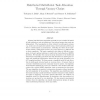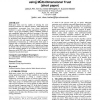752 search results - page 74 / 151 » Multiagent simulation of learning environments |
110
Voted
ICRA
2003
IEEE
15 years 7 months ago
2003
IEEE
Existing task allocation algorithms generally do not consider the effects of task interaction, such as interference, but instead assume that tasks are independent. That assumptio...
111
Voted
ATAL
2009
Springer
15 years 9 months ago
2009
Springer
We present a general methodology to automate the search for equilibrium strategies in games derived from computational experimentation. Our approach interleaves empirical game-the...
118
click to vote
CORR
2011
Springer
14 years 6 months ago
2011
Springer
Imitation can be viewed as a means of enhancing learning in multiagent environments. It augments an agent’s ability to learn useful behaviors by making intelligent use of the kn...
ATAL
2008
Springer
15 years 4 months ago
2008
Springer
Multi-agent teams must be capable of selecting the most beneficial teammates for different situations. Multi-dimensional trustworthiness assessments have been shown significantly ...
90
Voted
ECML
2003
Springer
15 years 7 months ago
2003
Springer
Abstract. Most of multi-agent reinforcement learning algorithms aim to converge to a Nash equilibrium, but a Nash equilibrium does not necessarily mean a desirable result. On the o...


